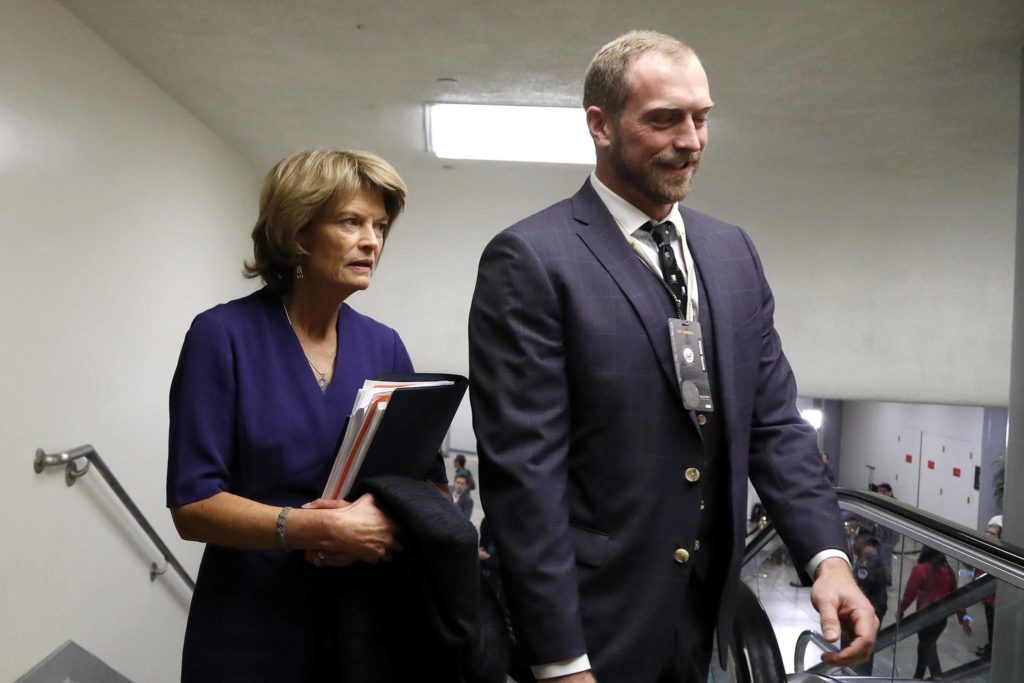
Ten years ago, U.S. Sen. Lisa Murkowski, R-Alaska, bucked the GOP party establishment by waging a write-in campaign which ended with her re-election. Now I’m not referring to how she votes in the impeachment trial of President Donald Trump when I say this, but Americans would benefit that kind of independence today. Because the polarization that’s poisoning our democracy won’t end with removing him from office.
And it’s not as simple as sending a Democrat to the White House.
But a moderate Democrat like Amy Klobuchar with a Republican running mate like Murkowski has at least a fighting chance to change the tone to our political discourse.
I don’t seriously expect this to happen. But let me explain the idea through two relevant Alaskan stories that begin with a Democrat from Connecticut.
In 2006, Sen. Joe Liebermann lost his primary race to a more liberal candidate. But he stayed on the general election ballot as an independent and was re-elected with help from Republican party members and voters.
After Sen. John McCain had secured the Republican party nomination for president two years later, he initially wanted to nominate Liebermann as his running mate. But he was warned that choosing him would divide his party. So instead, McCain selected Alaska Gov. Sarah Palin.
A decade after his losing the presidential election, McCain admitted he regretted not choosing Liebermann. But the remorse felt by Steve Schmidt, the chief strategist for his campaign, is more revealing. In an interview he gave four years after the race, he’d said Palin was creating “a divisive message for the national stage when we need leaders in both parties to have a unifying message.”
By winning a three-way race with crossover support from Democratic voters, Murkowski replicated the first part of Liebermann’s story in 2010. But more to the point, the necessity of her write-in campaign began by losing the primary to a polarizing Tea Party candidate who Palin had endorsed.
Now let’s jump to Alaska’s 2014 race for governor.
“Byron Mallott and I are rising above partisan politics to form the independent team of Walker-Mallott for governor and lieutenant governor,” Bill Walker wrote soon after he and Mallot joined forces. To make that happen, Mallott had to withdraw from the ballot as the Democratic party nominee for governor. And Walker, a lifelong Republican who had entered the race as an independent, agreed to drop his party affiliation.
Now it’s likely both would have been on the losing side of a three-way race. And it’s true they only served one term. But if oil prices hadn’t collapsed, there’s a good chance they would have been re-elected.
In any case, what really matters is after they won, they formed a bipartisan cabinet. And brought all but the most stubborn party members together to seek the best path forward for Alaska.
Unfortunately, the Republican base resented Walker’s partnering with Democrats. Polarization followed in the form of obstructionism by the Republican senate majority. And after three years, Democrats pushed back by wanting their own candidate for the 2018 race.
And what did we get. A governor whose hasn’t been able to keep the campaign promises that got him elected.
An analysis of a potential Sen. Bernie Sanders presidency by David French helps explain why Gov. Mike Dunleavy hasn’t succeeded. Writing at The Dispatch, a conservative online magazine, he argues that the people’s revolution Sanders promises won’t materialize because “vulnerable Democrats from purple states” won’t cooperate to enact “the largest and most consequential government expansion in the nations’ history on a bare majority vote.”
In Dunleavy’s case, it’s been a bipartisan house majority and bipartisan cooperation in the senate that formed the centrist barrier to budget cuts he hoped would extensively shrink government. But the part that really matches French’s argument is the “familiar pattern of overpromising and underdelivering.” And that’s “teaching a generation of polarized, angry activists that politics does not work.”
It won’t work until we accept that the true art of democracy is crafting the sensible compromises that moves society toward progress. Sure, sometimes it’s taken too long. But being stuck in a stalemate is worse. So, if we want our government work again, we ought to at least have a conversation about putting a bipartisan team in the White House.
"Opinion" - Google News
February 02, 2020 at 07:00PM
https://ift.tt/37TaOYD
Opinion: The true art of democracy - Juneau Empire
"Opinion" - Google News
https://ift.tt/2FkSo6m
Shoes Man Tutorial
Pos News Update
Meme Update
Korean Entertainment News
Japan News Update
No comments:
Post a Comment